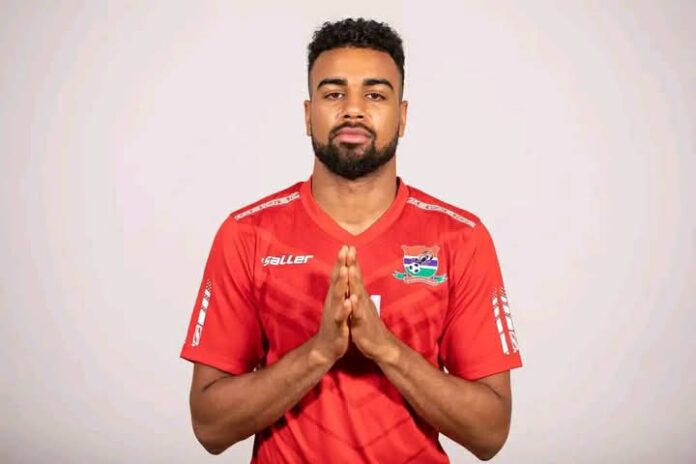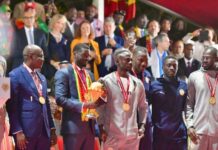Mamour. M Mbenga commonly known as Kifa Barham a renowned Journalist and Sports Development Manager raise public concern on the recent dispute between Gambian International Footballer Noah Sonko who recently make comments and decision to withdrew his participation with the Gambia National Team, Noah disclosed his disappointment related to organizational standards of the Gambia Football Federation(GFF).
He reveals his past experience and ordeal with football authorities.
Kifa Barham a Diploma – Certificate Holder on Football Business Manager & HR, Sports Governance and Leadership, a graduate at the National Sports College and Valley View University in Ghana urge all stakeholders to dialogue for the interest of football.
Kifa who is currently in abroad pursuing his international certifications on Fitness Coaching and Sports Nutrition with National Academy of Sports Medicine(NASM), further shared below a guiding framework an insight and professional understanding of sports governance and leadership in any organize industry.
*Building Effective Relationships with Stakeholders in the Sports Industry*
Building effective relationships with stakeholders in the sports industry is essential for the success and sustainability of sports organizations, teams, and events. Stakeholders in sports including athletes, fans, sponsors, media, government institutions, and the local communities should effectively adhere to these guiding principles and responsibilities.
This requires a proactive and ongoing effort to meet their needs and expectations.
Strong relationships can lead to increased support, loyalty, and success for sports organizations, teams, athletes and sporting events / competitions.
*Role, Responsibilities of Government and Regulatory Bodies*
Sports Governance, leaderships and administration are organizational structures and guiding framework that should truly act on and Comply with all relevant laws, regulations, and policies governing sports management and administration at various levels both local and international.
This method serves as professional mechanism that build positive relationships with government authorities, regulatory bodies, athletes and other stakeholders through transparent and ethical practices.
*Understand Their Needs and Expectations*
Government and other related sporting organizations should assess the needs, expectations, understanding and interests of each stakeholder group.
This crucial approach will give opportunity to their official committees to Conduct surveys on focus groups, and market research to gather insights and problem solving.
*Athlete Engagement*
Government Institutions, National Associations should continue to Foster strong relationships with athletes by providing support, clear communication on mutual understanding and benefits.
Therefore, to avoid future disputes and conflict of interest.
These varieties of partnership will Include athletes in decision making, related to their sports career and concern.
It is crucial for these stakeholders to engage athletes on matters related to organizational challenges, constraints, resource availability, technical operations related to the athletes needs and demand in their participations both national and international competitions.
*Importance of Athlete Representation*
Athletes are key stakeholders in any sports industry, Regulatory Bodies should ensure athletes have a voice in sports governance if the need arises.
Athletes’ rights advocacy and interests should be a growing concern with can have a positive influence in decision – making processes.
*Athlete Welfare*
Regulatory Bodies and Decision Makers should ensure the physical and mental well-being of athletes, as well as their rights and protections, remains a key concern.
*Athlete Professional Image*
*Disclosure of Conflicts of Interest* During my studies in Ghana on Sports Governance and Leadership; I have learned that it is the fundamental rights of individuals involved in sports organizations, including administrators, officials, and athletes, to disclose any conflicts of interest that may affect their decision making base on transparency, accountability and professional ways of engaging the dispute – matter both in public and official.
Athletes should also take into considerations of such sensitive issues and public comments that may affect unresolved disputes or cause public distress among fans and sporting organizations.
*Conflict Resolution*
Address conflicts and disputes promptly and professionally, whether they involve athletes, sponsors, fans or other stakeholders.
Establish clear procedures for handling grievances and disputes.
Government Institutions, Regulatory Bodies and other Sporting Organizations should set a policy framework that shall guide all laws, Code of Conduct, rules and regulations that shall be the steering wheels to govern and constitute these core values, ethics and principles. In any conflict situation; Professionalism, the Transparency and accountability takes the baton in effective decision – making.
In any arising conflicts it is important to set an independent mediate body; ethics commissions or disciplinary committees.
These are independent oversight bodies that oversee, review and ensure that transparency in key areas.
*Feedback Mechanisms*
Sporting Organizations Should Create feedback mechanisms that allow all stakeholders to provide input and express concerns. Act on feedback when appropriate, and communicate the actions taken.






